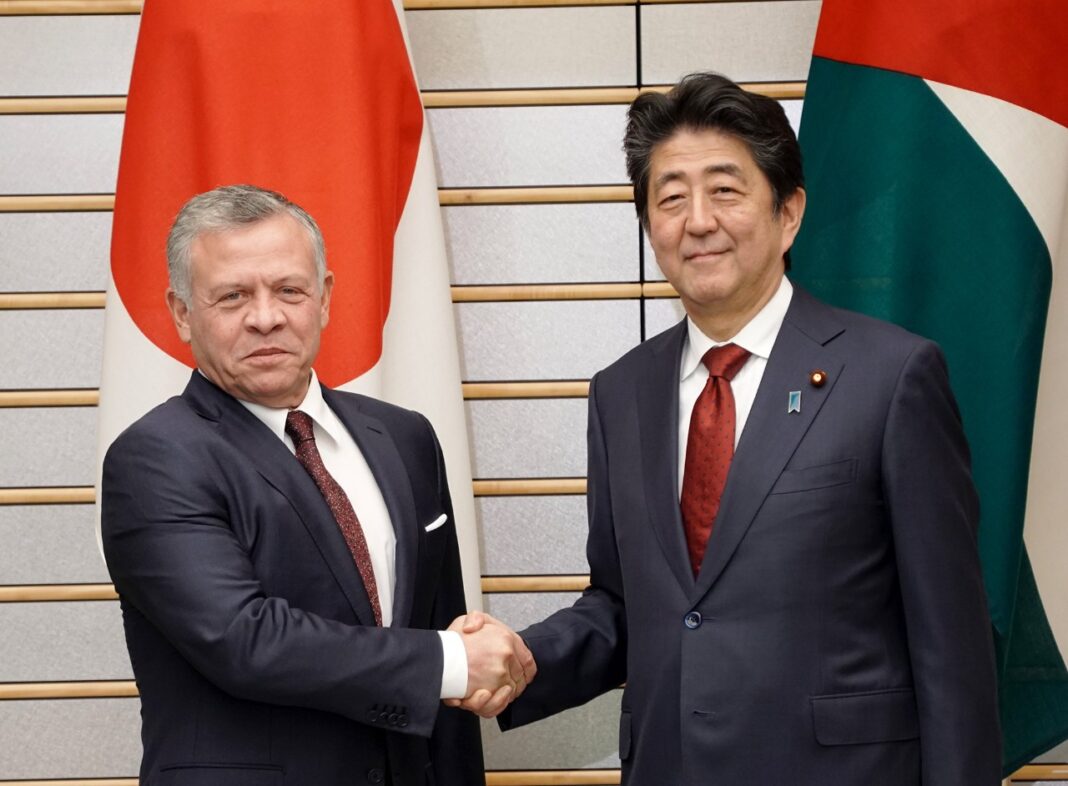DUBAI: Japan’s former Prime Minister Abe Shinzo passed away on July 8 at 67-years-old, after being shot during an election speech in Nara Prefecture.
Abe was the longest serving Prime Minister in Japan’s political history. He held office in 2006 for one year and again from 2012 to 2020. Abe was Japan’s youngest prime minister since World War II when he first took office.
Throughout his time in office, Abe was known for his foreign policy, particularly with the Arab world. He played a big role in strengthening the cooperation and friendly relations between the Middle East and Japan.
In 2020, Abe toured the Arab world, visiting Saudi Arabia, the United Arab Emirates and Oman.
In January that year, Abe arrived in Saudi Arabia and met with Saudi Crown Prince Mohammed Bin Salman to discuss the bilateral relations between the two countries.
Abe got the full support from the Crown Prince for the MSDF mission, which is aimed at gathering information to ensure safe navigation by ships related to Japan in the region.
Two P-3C patrol planes of the MSDF set out on their mission in January and the MSDF’s Takanami destroyer left for the Middle East on Feb. 2, 2020.
The two leaders agreed then to maintain efforts that would ensure stability and peace in the region.
During his trip, the former Japanese Prime Minister’s tour of AlUla cast a spotlight on the ancient Nabataean site. It was his last stop before continuing to the UAE and Oman.
Abe also met with Saudi’s King Salman in Riyadh and confirmed their cooperation toward the successes of the Group of 20 meetings to be hosted by Saudi Arabia this. In their 40-minute talk, the king expressed expectations that his country and Japan will deepen their strategic partnership in various fields, not only in the area of energy.
In the UAE, Sheikh Mohamed bin Zayed, then Crown Prince of Abu Dhabi and Deputy Supreme Commander of the UAE Armed Forces, received Abe and the two counterparts discussed efforts to boost diplomatic ties in order to ease tensions in the region.
The two also witnessed the signing of the UAE-Japan Strategic Energy Cooperation Agreement between the Abu Dhabi Supreme Petroleum Council.
The agreement was represented presented by Abu Dhabi National Oil Company (ADNOC) and the Agency for Natural Resources and Energy of Japan, for the storage of over 8 million barrels of crude oil at storage facilities in Japan, reported WAM.
The last leg of Abe’s Arab tour was in Oman, where the former PM met with Haitham bin Tareq, who took office following the death of long-serving Sultan Qaboos.
Abe offered his condolences for the death of the Sultan. They also agreed to cooperate for regional stability and to develop their bilateral relations, said a Japanese foreign ministry statement.
In 2015, Abe visited Egypt, Jordan, Israel and Palestine to reaffirm the friendly relationship with major countries in Middle East.
Abe engaged in encouraging the realization of peace between Israel and Palestine, which is indispensable for the stability of the region.
In Jordan, Abe vowed to support the country that was on the frontline of efforts to counter Daesh.
Japan and Jordan enjoy an extremely amicable relationship based on the close ties between the Imperial Family and the Royal Family, and active exchanges between the countries’ leaders continue.
Jordan’s King Abdullah II and Abe reaffirmed that the strategic relationship between the two countries would be developed further, and they would continue to cooperate on promoting peace and stability.
At the time, Abe expressed concern about the chain of violence and mistrust in Israel and Palestine, and requested that actions that are likely to escalate the conflict be avoided.
He strongly requested a review of the suspension of the return of tax revenues to the Palestinian Authority that was being implemented by Israel, and also requested a halt to settlement activities, which violate international law.
In his meeting with Palestinian president Mahmoud Abba in 2015, Abe directly conveyed his intention to strengthen Japan’s commitment and support for Palestine’s nation-building effort, including assistance of 100 million US dollars in order to achieve a two-state solution.
Prime Minister Abe requested Palestine, which was undertaking diplomatic measures at the UN and international organizations, to refrain from any actions, which undermine efforts for resumption of negotiations and Middle East peace.
The term Abenomics was coined in 2012 after Abe implemented economic policies to revive Japan’s economy out of deflation. When Prime Minister Abe assumed office in 2012, the country was still recovering from the 2008/09 recession.
The late minister also played a big role in the winning of the 2020 Tokyo Olympics.
Abe filed his unexpected resignation in late August of 2020, citing a chronic illness. The ex-PM was known for his personal relations with foreign leaders around the world and his strong ties with the likes of Saudi’s King Salman, Crown Prince Mohammed Bin Salman and other Arab leaders.




